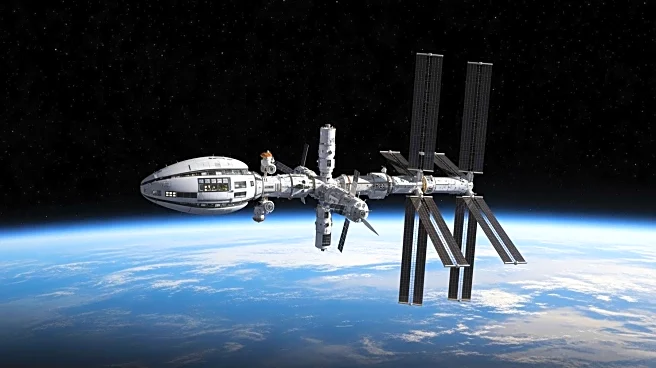What's Happening?
The International Space Station (ISS) is celebrating 25 years of continuous human presence in space. Since November 2, 2000, when three astronauts first became full-time workers at the ISS, the station has remained occupied. The ISS, a collaborative effort
supported by the United States, Russia, and other countries, serves as a significant scientific laboratory orbiting Earth at approximately 250 miles above the surface. It facilitates unique experiments in low gravity, contributing to research that may benefit future space missions. Initially, the ISS was a basic structure with only three rooms, but it has since expanded to the size of a football field, featuring multiple laboratories, exercise equipment, and communication tools. Over the years, 290 individuals from 26 countries have lived and worked on the ISS, including professional astronauts and private visitors. Despite challenges such as space debris and technical issues, the ISS has exceeded its original 15-year mission plan and is expected to continue operations until 2031.
Why It's Important?
The ISS represents a milestone in international cooperation and scientific advancement in space exploration. Its continuous operation has allowed for extensive research on the effects of space on the human body, as demonstrated by studies like the one involving astronaut Scott Kelly. The station's longevity underscores the potential for long-term human habitation in space, paving the way for future missions and technological developments. The ISS has also become a platform for commercial space activities, with private individuals visiting and even filming movies aboard the station. As the ISS approaches retirement, its legacy will influence the development of new space stations by private companies, potentially transforming the landscape of space exploration and international collaboration.
What's Next?
The ISS is scheduled to be retired in 2031, with plans for NASA and SpaceX to guide it back into Earth's atmosphere, where it will mostly burn up upon re-entry. NASA aims to transition to privately built and operated space stations, which could offer new opportunities for scientific research and commercial ventures in space. Meanwhile, China has already established its own space station, Tiangong, indicating a shift towards more diverse international participation in space exploration. The retirement of the ISS will mark the end of an era but also the beginning of new possibilities for space habitation and research.
Beyond the Headlines
The ISS has been a symbol of peaceful international collaboration, bringing together countries with diverse interests to work towards common scientific goals. Its success has demonstrated the potential for cooperative efforts in addressing global challenges beyond Earth. The transition to privately operated space stations may raise questions about the commercialization of space and the ethical implications of private ownership of space habitats. As space exploration continues to evolve, the lessons learned from the ISS will be crucial in shaping future policies and practices in the industry.

















